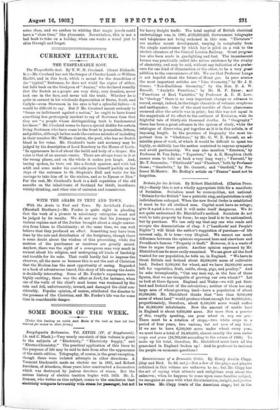Britain for the British. By Robert Blatchford. (Clarion Press. 3d.)—Surely
this is not a wholly appropriate title for a manifesto of Socialism. Socialism must be cosmopolitan, not national. "Britain for the British" has a patriotic ring, and patriotism is only individualism enlarged. When the new Social Order is established it must be for all civilised men. Capital must have no refuge ; give it spied h terre, and it will make itself dangerous. We do not quite understand Mr. Blatchford's method. Socialists do not wish to take property by force; he says land is to be nationalised, but by purchase. We can only say that any one who reads and accepts the denunciations of chap. 5 (" Landlords' and People's Rights") will think the author's suggestion of purchase—of life interest only, it is true—very illogical. We cannot see much difference between the opinions expressed here and elsewhere and Proudhon's famous "Property is theft." However, it is a waste of time to argue these points. Another opinion expressed by Mr. Blatchford can be more easily examined. We can grow all the food wanted for our population, he tells us, in England. " We have in Great Britain and Ireland about 83,000,000 acres of cultivable land. Deduct 9,000,000 for wheat, and we have 24,000,000 acres left for vegetables, fruit, cattle, sheep, pigs, and poultry." And he asks triumphantly, " Can any man say, in the face of these figures, that we are incapable of growing our own wheat P" Let us look at these figures. England and Wales—we will put Scot- land and Ireland out of the calculation ; neither of them has any large area of wheat-growing land—have a population of about 81,000,000. Mr. Blatchford thinks that "less than 9,000,000 acres of wheat land" would produce wheat enough for 40,0000,000 ; proportionately, therefore, about 6,100,000 acres would suffice for 81,000,000 inhabitants. Now the amount of arable laud in England is about 8,650,000 acres. Not more than a quarter of this, roughly speaking, can grow wheat in any one year. There must be a rotation of crops,—two white crops in a period of four years, two various, but not corn of any kind. If we are to have 6,100,000 acres under wheat every year, we must have a total of 24,400,000, almost exactly the area under crops and grass (24,763,000 according to the return of 1899). To make up his total, therefore, Mr. Blatchford must have all the grass-land in England broken up ! And he professes to instruct the people on economic questions 1


































 Previous page
Previous page